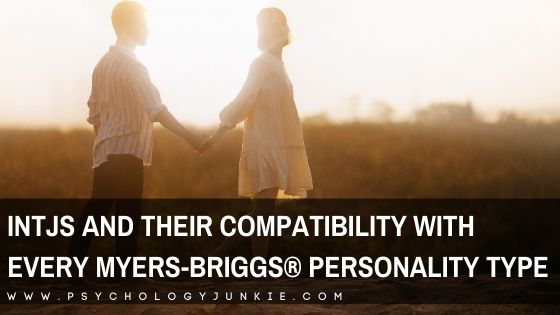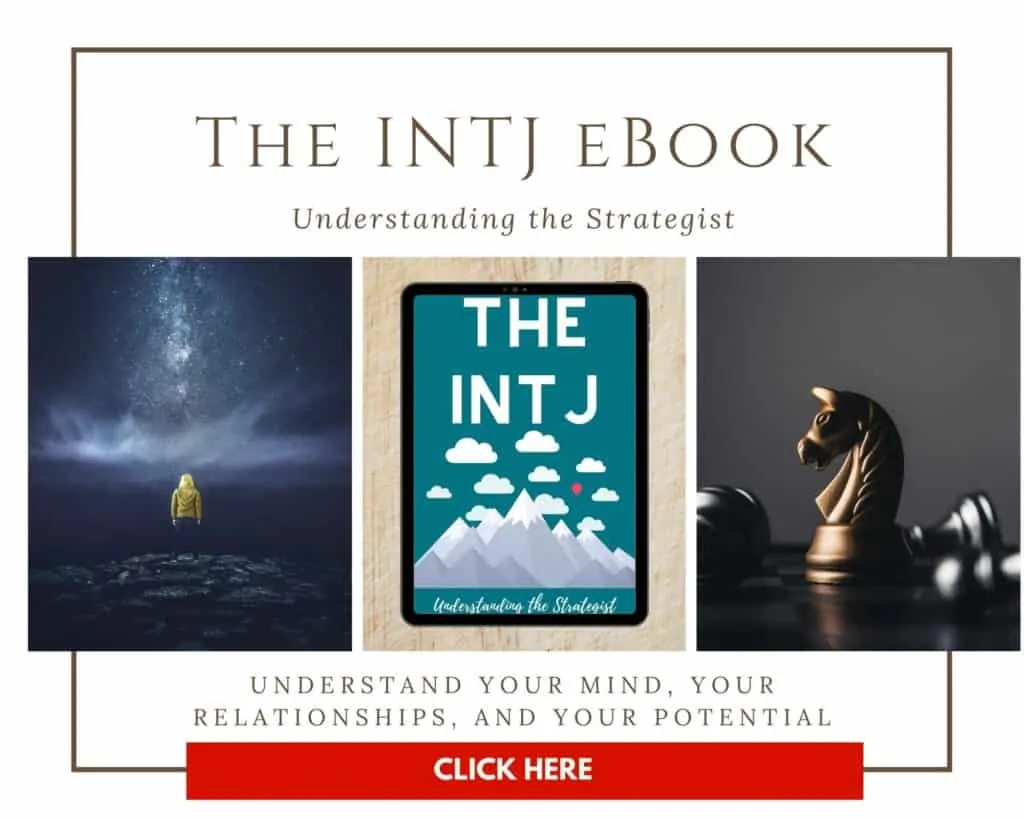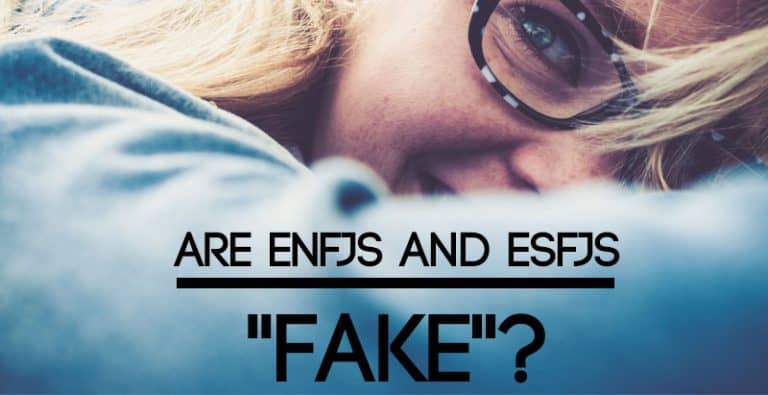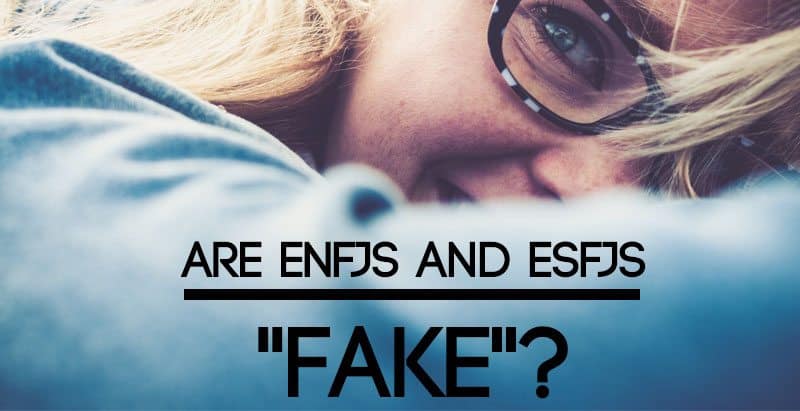INTJ Compatibility with Every Myers-Briggs® Personality Type
How compatible are INTJs with the 16 different personality types in the Myers-Briggs system? Today we’re going to look at the strengths and potential weaknesses in each relationship pairing, and I hope that this will give you some insight into your own relationship! Remember, you can find out a lot more in our eBook, Discovering You: Unlocking the Power of Personality Type!
Not sure what your personality type is? Take our new personality questionnaire here. Or you can take the official MBTI® here.

Estimated reading time: 16 minutes
INTJs and Their Compatibility with Every Myers-Briggs® Personality Type
INTJs and ENFPs
Driven by ideas, visions, and insights, ENFPs and INTJs can have an irresistible spark and attraction to each other. ENFPs are drawn to the intellectual bravery and focus of the INTJ, while INTJs are drawn to the charisma, imagination, and innovative beauty of the ENFP personality type. ENFPs are overflowing with sparkling ideas and possibilities, and INTJs enjoy discussing theories and concepts with them. INTJs are driven, efficient, and independent, and ENFPs enjoy the way they help to refine their ideas into action plans. However, no relationship pairing is conflict-free. ENFPs like a lot of variety and interaction with the outside world, while INTJs tend to need a lot of quiet time alone. If neither understands their partner’s social needs there can be a lot of arguments and frustrations. They also have very different needs for closure. INTJs like to have a decided, clear plan of action. ENFPs like their life to be more flexible and spontaneous. This can result in disagreements about how time should be used or how planning should be done.
You can find out MUCH more about this relationship in my article: An In-Depth Look at the INTJ and ENFP Relationship.
INTJs and ENTPs
These two types find mutual satisfaction in exploring theories, concepts, and intellectual philosophies. Both enjoy a direct, logical route of problem-solving, and both have a high stamina for critique and debate. In the ENTP, the INTJ finds someone who opens their mind to more alternatives, possibilities, and opportunities in the outside world. In the INTJ, the ENTP finds someone who helps to refine their ideas and create action plans for them. Many of the conflicts that these types run into stem from their different lifestyle needs. ENTPs like a lot of flexibility and spontaneity in their life – narrowing down options can be boring to them because they’d rather add MORE options. INTJs like a clear plan and sense of direction – adding more options can feel like it’s getting in the way of finding one clear, singular path. Both can feel that the other is stifling their natural tendencies – the ENTP feels like the INTJ is being pushy or controlling, and the INTJ feels like the ENTP is procrastinating or being too “flighty.” If both types can learn to work with their respective lifestyle needs there can be a strong bond and a shared sense of purpose and vision.
INTJs and INFPs
The bond between INTJs and INFPs is extraordinarily deep and meaningful. In the INFP, the INTJ finds someone who helps them to explore their core desires and emotional needs. In the INTJ, the INFP finds someone who helps them to bring their creative ideas to fruition through clear plans of action. As introverts, both types respect the other’s need for quiet time and personal space. Most of the conflicts in this relationship relate to the Thinking/Feeling difference. INFPs make their decisions based on their personal values, with a desire for maintaining inner harmony. INTJs make their decisions based on impersonal analysis (looking at the pros and cons, cause and effect, etc,.). INFPs can feel that INTJs are too detached from their personal needs, while INTJs may feel that INFPs are overly-sensitive and blind to “the facts.” That said, they can both help each other to grow in these areas. INTJs NEED to tune into their values when they make decisions, and INFPs can use the balance of an objective, logical perspective in their decisions. If these two partners can see their differences as strengths rather than weaknesses, then their relationship can be unbreakable.
INTJs and INTPs
This relationship is rare but rewarding as both INTJs and INTPs find in each other an outlet for their intellectual energy and creativity. In the INTP, the INTJ finds someone who, like them, enjoys unpacking concepts and discussing theories. However, the INTP can present alternatives and angles that the INTJ might never have thought of before. They also admire how INTP’s stick to their logical principles and can see many different leverage-points while problem-solving. INTPs appreciate how INTJs can come up with strategic action plans so their many ideas can come to life. They enjoy the efficiency, singular-focus, and vision of the INTJ. The biggest roadblock that this couple encounters has to do with their different lifestyle approaches. INTPs tend to be flexible and explorative with their time, while INTJs see time as a precious resource that should be used judiciously. INTJs are planners, while INTPs are explorers. The INTJ can get frustrated with the more wandering approach of the INTP, while the INTP can feel controlled or pressured by the INTJ. This can lead to arguments and discomfort for both types. Another issue this type pairing has is with sharing emotions. Neither type is particularly fond of unpacking the emotional components of a disagreement, so they may simply ignore the emotional aspects of a problem. Because of this, resentment and frustration build and can cause their connection to erode. Taking time every day to deal with the emotional aspects of their lives may be uncomfortable, but it also important so that neither type is stuck in a resentment loop with the other.
INTJs and ENFJs
This relationship is often one of growth, challenge, and progress. INTJs and ENFJs are both drawn to each other for their shared sense of vision and possibility. Because both types share Introverted Intuition in common, they both enjoy refining concepts, exploring philosophical depths, and focusing on the long-term goals of their lives. In the ENFJ, the INTJ sees someone with emotional power, influence, and authenticity. In the INTJ, the ENFJ sees someone with a long-range strategic mindset and intellectual independence. The differences and similarities help to create a spark of mystery between them, while also providing some shared perspectives. Troubles erupt when the couple cannot agree on decisions. ENFJs consider all the interpersonal components of a decision first, while INTJs consider the logic and impersonal components first. ENFJs often feel that INTJs are too cold or dismissive of personal concerns, while INTJs often feel that ENFJs are “people-pleasers,” who are too affected by the needs of others. Struggles can also arise when they don’t respect each other’s energy needs. ENFJs like to be out and about, socializing, and getting to know a variety of people. INTJs are more reclusive and quiet, energizing by sinking into their thoughts and ideas. Both may unknowingly patronize the other and their respective needs. To help avoid problems, INTJs should learn about Extraverted Feeling (the dominant function of the ENFJ) and ENFJs should learn about Extraverted Thinking (the auxiliary function of the INTJ).
INTJs and ENTJs
This relationship is one of power and philosophical discovery. INTJs and ENTJs share the exact same cognitive functions, but in a slightly different order. They are both driven by a need for knowledge, competence, and intellectual understanding. They see the world in a very similar, global way and frequently share common interests and desires. However, because they are so similar, they can serve as reminders of each other’s flaws. They will both have similar blind spots – they might forget about “insignificant” details that later cause them big problems. They both may de-value their physical needs only to wind up burned out and exhausted. They both may avoid talking about emotional concerns and dynamics until resentment has festered to an extreme degree. They can also struggle with varying social needs. ENTJs like to be out and about, working on projects, and discussing ideas with a variety of people. INTJs like to withdraw into the solace of their minds and thoughts more frequently. This can result in them both getting irritated if their social needs aren’t shared or respected. It’s crucial for this pair to make time each day to share their emotional experiences and needs, even if it feels awkward or uncomfortable. This helps them to avoid resentment and misunderstandings. It’s also important for them to realize that they have different social needs, and there’s nothing wrong with that. Neither should try to force the other into their own introverted or extroverted style.
INTJs and INFJs
This relationship is bound to be both intriguing and intense. Both of these types look for grand patterns, connections, and possibilities. Both are attracted to the abstract and theoretical more than surface-level realities. However, where INFJs make decisions based on the dynamics and needs of the people around them, INTJs will make decisions by weighing the pros and cons and looking at the logical components. This can lead to conflict when both types reach an impasse on a decision. However, during these times they can help each other to grow and see outside themselves to make better decisions. INFJs can help INTJs to see the personal impacts of each decision, and INTJs can help INFJs to see a more straightforward, logical approach to problem-solving. This can be a relationship with a few conflicts, but it can also be one of tremendous growth and fulfillment. You can find out a lot more about this relationship here: Your Guide to the INFJ and INTJ Relationship.
INTJs and INTJs
In this pairing, INTJs find a true “kindred spirit” who can understand their lifestyle preferences and needs. In a type-alike pairing, INTJs find in their partner a similar quest for knowledge, competence, understanding, and insight. Both will prioritize the same information and de-prioritize the same information. This can be both a blessing and a curse. They both might enable each other in their weaknesses, but also help each other to grow in their respective strengths. This relationship is often ideal when the partners come from different backgrounds, so they still have some new perspectives and skills to share. Problems to look out for include: Forgetting to tend to physical needs, inattention to detail, and lack of emotional support. INTJs tend to be private and reserved about their feelings, and so they may both hide their frustrations with each other, only to cause resentment later on. It’s important for these duos to prioritize time for open discussion about feelings and emotional needs so that they keep their romantic spark alive and avoid misunderstandings.
INTJs and ESFPs
This relationship is both challenging and highly rewarding. INTJs and ESFPs have the exact same cognitive functions, but in a completely reversed order. This enables them to help each other grow and find balance, while also challenging them to broaden their way of thinking. In the ESFP, the INTJ finds an adventurous soul who sparks their sense of opportunity. They also see someone who is emotionally authentic and compassionate. In the INTJ, the ESFP finds someone with intellectual intensity and focus. They also see someone who can help them make more effective, strategic decisions. Problems can arise in this relationship when the duo disagrees on lifestyle preferences. ESFPs like to be spontaneous, flexible, and ready for anything. INTJs like to have life planned-out, scheduled, and organized. They can irritate each other when they refuse to fall into line with their partner’s natural tendencies. They can also struggle in decisions at times. ESFPs prioritize exploration, inner harmony, and their personal values when they make decisions. INTJs prioritize the impersonal facts, pros and cons, and logic when they make a decision. This can result in them reaching an impasse on decisions where both need to find agreement. Sitting down and mapping out both perspectives on paper can help both partners to see the advantages to each perspective and reach a happy compromise.
INTJs and ESTPs
These types are drawn to each other because they both offer something the other lacks. In the ESTP, the INTJ sees someone who is energetic, realistic, and quick on his or her feet. In the INTJ, the ESTP sees someone who is visionary, strategic, and insightful. INTJs find the down-to-earth, charming nature of the ESTP refreshing, and ESTPs find the visionary confidence of the INTJ intriguing. ESTPs can help INTJs to live in the moment, pay attention to earthly delights and wonders, and find practical solutions to crises or dilemmas. INTJs can help ESTPs to see long-range implications and the deeper meaning behind things. Together, they can be a strong force – balancing each other’s weaknesses and challenging each other to grow. That said, this pairing isn’t totally conflict-free. INTJs can get overwhelmed by the ESTP’s need for action and engagement. ESTPs can get overwhelmed by the INTJ’s need for philosophizing and theoretical pursuits. They risk being condescending to each other as their greatest strengths are naturally the other type’s greatest weaknesses. ESTPs tend to think Sensing-related concerns are the most valuable, while INTJs think Intuitive-related concerns are the most valuable. This can result in many bitter arguments if they can’t agree to see their strengths as equal in value.
INTJs and ISFPs
There’s a sense of kinship and growth that happens in this deep, passionate relationship. INTJs and ISFPs share the same cognitive functions, but in a different order. INTJs find the emotional depth, authenticity, and pragmatism of the ISFP refreshing and attractive. Likewise, ISFPs find the insight and effectiveness of the INTJ energizing. Both types have a strong sense of purpose and a need for their own space. Problems can arise in this relationship when the Thinking/Feeling preference collides. INTJs can seem abrupt and overly-impersonal to ISFPs, and ISFPs may seem overly sensitive and biased to INTJs. Differences in perspectives can also cause rifts. INTJs focus on theories and abstract connections first, whereas ISFPs focus on real-world facts and details first. On bad days, ISFPs might berate INTJs for having their “head in the clouds,” while INTJs might accuse ISFPs of lacking depth or vision. If both types take the time to learn about each other they can avoid a lot of conflict and disagreement.
INTJs and ISTPs
At first glance, these two types appear very similar. Both are reserved, logical, and intellectually curious. Initially, these similarities tend to draw these types towards each other. Often, they come together as friends before forming relationships. ISTPs are the ultimate realists, blending common-sense cleverness with keen instincts about the world around them. INTJs are the ultimate visionaries, blending strategic know-how with insights into the deeper meaning of things. They both can learn tremendous amounts from each other, but they can also struggle to reach an emotional connection. They are both so private about their emotional worlds that it can be difficult for them to open up to each other and find warmth and deeper connection. ISTPs are usually slightly more emotionally open than INTJs, and they can feel irritated when they (uncomfortably) express their feelings, only to find that the INTJ is even more unreadable than they are. It’s important for these types to find time to express their feelings to each other, even if it feels awkward. Pushing past the awkwardness, even laughing about the discomfort, can be an important step towards growth for these duos.
INTJs and ESFJs
Opposites can attract, and that is certainly the case in this relationship! INTJs and ESFJs share none of the same primary cognitive functions, and so they tend to understand the world in vastly different ways. In the ESFJ, the INTJ sees someone with down-to-earth friendliness, charisma, and practicality. In the INTJ, the ESFJ sees someone with intriguing intellectual insights and vision. The fact that each of these types finds the other so perplexing can be an attractive mystery in and of itself. However, it can also be the root of many bitter arguments. ESFJs like a deep, transparent emotional connection with their partner. They want to know their partner’s feelings about EVERYTHING – and right away. INTJs keep their feelings close to the chest, and would rather hear about their partner’s thoughts than their emotions; especially if those emotions seem to waver and change as the days progress. In decisions, ESFJs focus on the interpersonal components, while INTJs focus on the logical components. This can cause problems as both fight for power, believing that their perspective is best. Both tend to be on the stubborn side and may be unwilling to compromise. It’s important for couples in this relationship to learn as much as possible about their partner’s type, and learn to value the strengths their partner brings to the table. Knowing that differences are related to type can diffuse some of the emotional tension in disagreements.
INTJs and ESTJs
This power-couple is nearly unstoppable in anything they try to accomplish. Both are extremely ambitious, driven, and goal-oriented. INTJs are drawn to the practicality, outgoing energy, and productivity of the ESTJ. ESTJs are drawn to the intellectual acuity, independence, and insight of the INTJ. In disagreements, both types come at things dispassionately, and this can result in a comfortable lack of emotional turbulence. At the same time, the lack of emotionality can create a distance between the two long-term. Both can feel that there’s a lack of openness or warmth in the relationship if neither shares their deeper feelings. Both can also be alarmed by the other’s stress reactions. ESTJs in the grip of Feeling can become hyper-sensitive, while INTJs in the grip of Sensing become hyper-impulsive. Both might become judgmental when the other type is stressed, not understanding why their partner is behaving so unreasonably. Making time for emotional connection, even if it feels awkward, is important. Learning about each other’s stress responses is also vital.
INTJs and ISFJs
A rare type pairing, ISFJs and INTJs can find in each other a sense of comfort and quiet loyalty. Both types share a need for a quiet, organized lifestyle. Both prefer deep, one-on-one connection over large group gatherings. Because they each innately respect the other’s need for quiet, uninterrupted time, there’s a natural comfort level in the relationship. At the same time, there are some differences that can cause conflicts over time. ISFJs are extremely literal and down-to-earth, while INTJs are abstract and global thinkers. They can struggle to see eye-to-eye on things that each type thinks is “obvious.” And when explaining themselves, they can appear condescending to each other. The ISFJ believes that their facts and experiences are the most relevant, while the INTJ believes their insights and abstract connections are more relevant. In decisions, ISFJs rely heavily on their personal values while INTJs, by focusing on logic first, can seem uncaring to them. They can get into bitter arguments where both feel unheard or misunderstood by each other. Learning about each other’s cognitive functions can help tremendously when it comes to conflict management and connection. ISFJs use Si/Fe/Ti/Ne, while INTJs use Ni/Te/Fi/Se. You can learn about the cognitive functions here.
INTJs and ISTJs
These types have a lot of similarities that make the relationship smooth and conflict-free. Both types value objective logic and direct honesty. Both tend to have very deeply-held moral codes and prefer to keep their emotions closer-to-the-chest. However, where INTJs focus on the abstract and symbolic, ISTJs focus on the literal and concrete. ISTJs can help INTJs to see the relevant details and facts in a situation, while INTJs can help ISTJs to see the deeper meaning and patterns in a situation. ISTJs can draw from past experiences during moments of crisis, while INTJs can look forward to future implications. Conflicts can erupt in this relationship when both types are too guarded about their feelings. IxTJs despise the idea of being vulnerable, and so there can be a lack of depth or emotional connection. In arguments, both types can be unwilling to back down or admit defeat – seeing their way as the one right way. It’s important for both of these types to learn to actively listen, get comfortable with vulnerability, and to understand each other’s cognitive functions. INTJs should learn about Introverted Sensing, and ISTJs should learn about Introverted Intuition.
What Are Your Thoughts?
Find out more about your personality type in our eBooks, The INTJ – Understanding the Strategist, Discovering You: Unlocking the Power of Personality Type, The INFJ – Understanding the Mystic, and The INFP – Understanding the Dreamer. You can also connect with me via Facebook, Instagram, or Twitter!


Subscribe to Our Newsletter

Want to discover more about personality type? Get the inside scoop with Susan Storm on all things typological, along with special subscriber freebies, and discounts on new eBooks and courses! Join our newsletter today!












I encountered an ENFP, I confirm. Unable to arrive on time for a romantic date … Twice in a row.
Ok she works as the boss of an architectural firm …. So what? She seems very attracted, it’s curious, because we are particularly opposed … I find her very attractive for her authenticity, her energy, and her extraversion. But we don’t have the same values.
Time to abandon ship!